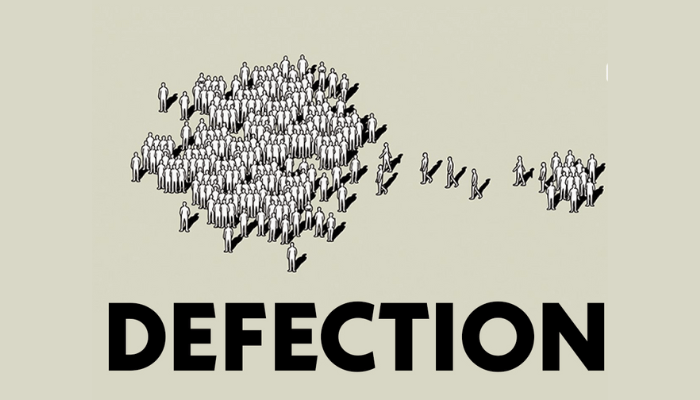Gale of defections and the place of the electorate
Since Nigeria’s return to democratic rule in 1999, few political moments have been as bewildering for the electorate as the current wave of defections sweeping through the political landscape. What used to be occasional acts of political realignment have now become a torrent of opportunistic crossings that blur ideological boundaries, mock internal democracy, and erode public trust in the Nigerian political process.
In recent months, the defections from the opposition Peoples Democratic Party (PDP) to the ruling All Progressives Congress (APC) have intensified, reshaping the political map ahead of the 2027 general elections. From governors to lawmakers and key party figures, the move has become both strategic and symbolic, an open confession that political survival, rather than conviction or ideology, remains the dominant belief in Nigerian politics.
Read also: APC’s Yilwatda hints at fresh ADC defections, says more politicians joining
The latest defections of Governor Douye Diri of Bayelsa State and Governor Peter Mbah of Enugu State, coming in quick succession, stunned even the most disinterested observers. Their speeches, hidden in vague appeals to “align with the centre for development” and “ensure continuity of progress,” offered no substantive justification. Their followers, including state assembly members and local government chairmen, dutifully followed, as if political conscience had been outsourced. To many Nigerians, it all felt like watching a well-scripted scene in a movie where the audience already knows the ending: those in power will always find a way to stay close to power.
Defection, by itself, is not new to democracy. It can be legitimate when driven by principle, when political ideals clash irreconcilably, or when a party deviates from its founding philosophy. But in Nigeria, defections are rarely about personal ideology or reform. They are about political convenience, protection, and access to state resources. The actors, rather than being guided by conviction, are motivated by the calculation that proximity to federal power guarantees political survival and economic benefits.
What makes this wave especially troubling is the sense of inevitability with which it is being conducted. Politicians speak as though the electorate no longer matters, as if their loyalty can be purchased or taken for granted. In the public statements accompanying these defections, the recurring undertone is that “our people will understand” or “we are aligning for the good of our state.” But the electorate, tired, disillusioned, and economically burdened, is neither consulted nor persuaded. They are simply expected to applaud and follow.
This assumption betrays a deeper democratic decay. When politicians begin to act as though elections are mere formalities and the people’s will is a negligible factor, democracy is in danger. The electorate, stripped of their role as the ultimate judge, become mere spectators in a game played by elites. The governors’ loyalists in state assemblies, who defect en masse without public explanation, only deepen the tragedy. Their silence reveals the extent to which internal party democracy has collapsed and how political institutions have been reduced to instruments of personal ambition.
Sadly, this is happening under a president who, as an opposition leader two decades ago, warned that Nigeria must never become a one-party state. Yet, the current gale of defections suggests a slow drift toward political monopoly, where dissenting voices are weakened, opposition structures dismantled, and governance becomes an echo chamber. A healthy democracy thrives on competition, debate, and ideological alternatives; when all that remains is the quest for self-preservation, governance becomes an act of consolidation rather than service.
For the Nigerian electorate, the implications are profound. Every defection that is not anchored on principle further erodes trust in the system. It reinforces suspicion and voter apathy. Why vote, many ask, when politicians change sides without shame or accountability? Why participate when loyalty to the people means nothing compared to loyalty to power? The electorate’s confidence is the oxygen of democracy; without it, the entire system suffocates.
Read also: Governors’ defections part of conspiracy for one-party State ADC
The way forward must therefore begin with a return to political ethics and institutional reform. The Independent National Electoral Commission (INEC) and the judiciary must strictly enforce constitutional provisions on defection, especially the clauses that require lawmakers to vacate their seats when they defect without a division in their party. Political parties, for their part, must strengthen internal democracy and make loyalty to principles more rewarding than loyalty to personalities.
Civil society and the media also have a crucial role: to call out opportunism and amplify the voices of ordinary citizens who feel betrayed. Democracy cannot thrive where accountability is selective or where political betrayal is normalised as a strategy.
Most importantly, the electorate themselves must rise above resignation. Nigerians must learn to reward integrity and punish inconsistency at the polls. Every vote should become a statement against political impunity. The idea that the people will always follow must be confronted and defeated at the ballot box.
Defection should be a tool for ideological realignment, not a shortcut to power. The politicians may believe they have mastered the game, but history shows that no political elite can permanently outsmart the people. When citizens finally awaken to the power of their vote, no gale of defections will be strong enough to subvert their will.
Until then, the current political drama will continue to play out like a bad movie, one in which the audience is forced to watch but never asked to choose the ending.
Osa Victor Obayagbona is the Chairman, Editorial Board of BusinessDay Media

